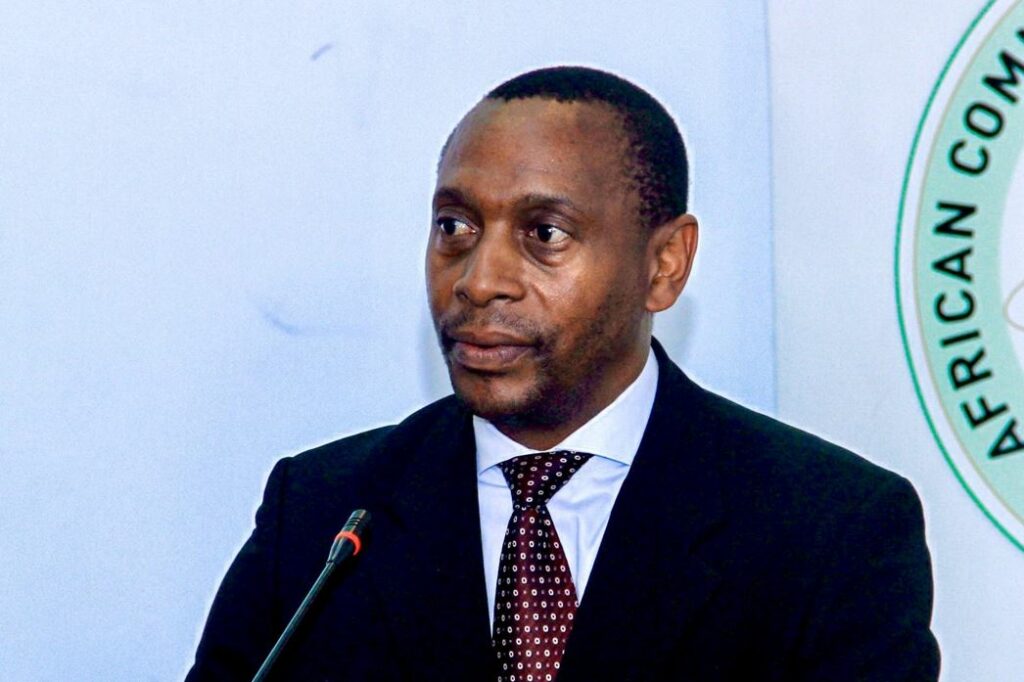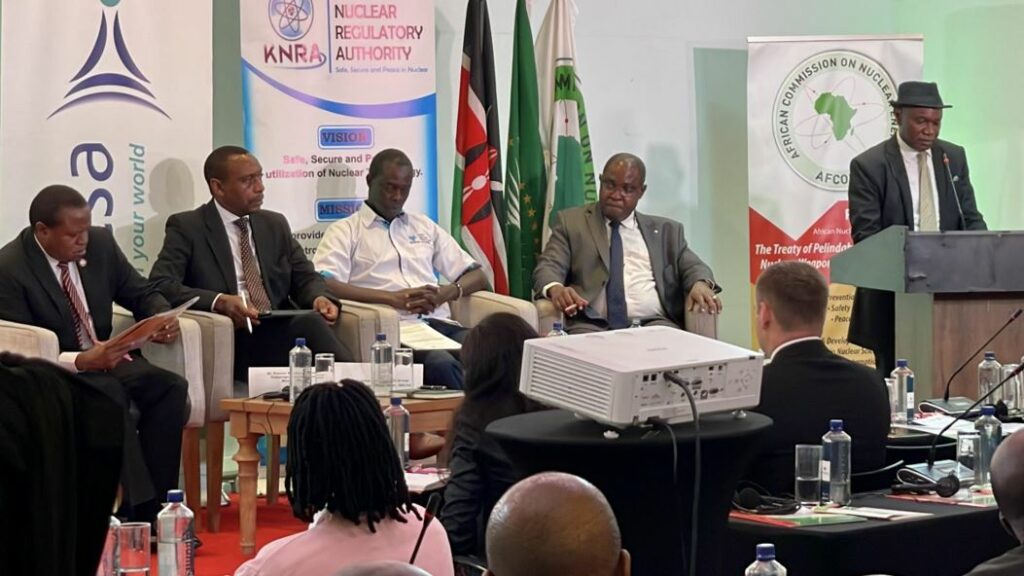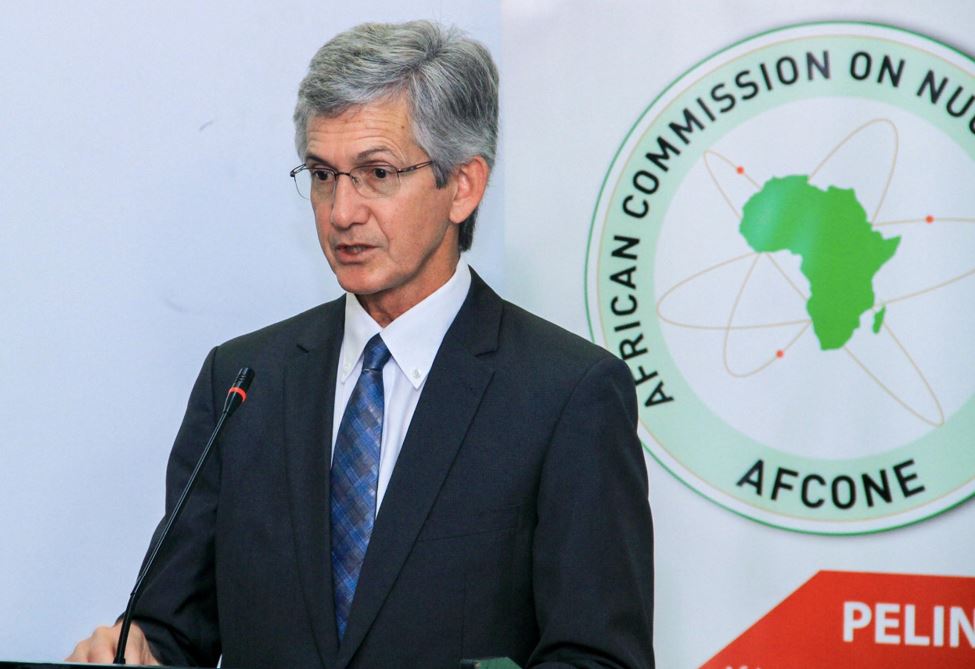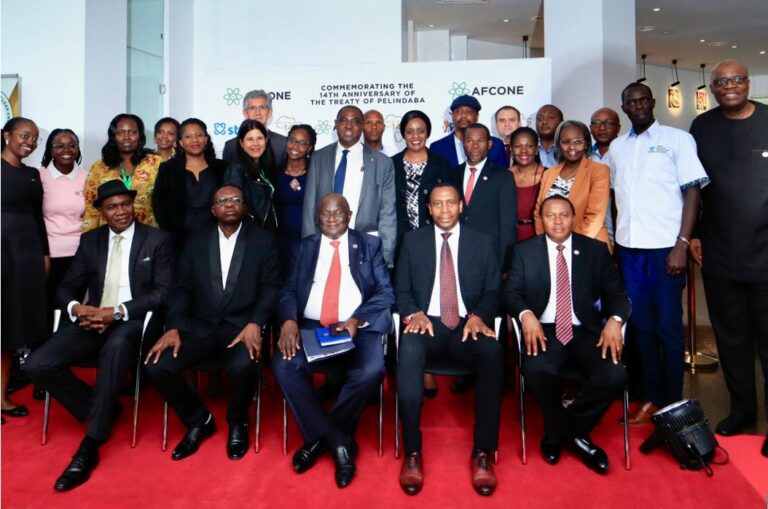On Saturday 15 July 2023, the African Commission on Nuclear Energy (AFCONE), joined by a party of high-profile representatives of the international nuclear community, celebrated the 14th Anniversary of the entry into force of the Treaty of Pelindaba at a gala event in Nairobi.
The commemorative event was attended by over 100 delegates from 14 different organizations and various African and European countries.
Delegates were treated to addresses from six eminent speakers, a display area with manned information stands from seven nuclear-related organizations or bodies, and a gala luncheon. The day was rounded off with a live address on new applications of nuclear technology in food and industrial irradiation by Professor Suresh Pillai, a prominent nuclear academic based in the United States of America.

Keynote and other speakers address Africa’s nuclear needs & potential
The keynote address was by His Excellency Honourable Davis K. Chirchir, Cabinet Secretary of Energy and Petroleum, Republic of Kenya, represented by Mr. Wycliffe Ogallo, Secretary Administration of the State Department for Energy, while welcoming remarks were made by His Excellency Mr. Enobot Agboraw, Executive Secretary of AFCONE.
Other speakers included Mr. Loyiso Tyabashe, Group Chief Executive Officer Nuclear Energy Corporation of South Africa (NECSA), Dr. Francis KURIA, International Campaign to Abolish Nuclear Weapons (ICAN), Mr. Justus Wabuyabo, Acting CEO, Kenyan Nuclear Power and Energy Agency (NuPEA), Mr. J.K. Chumba, Ag. Director General of Kenya Nuclear Regulatory Authority, and His Excellency Commissioner Gracien Bakambo Ekoko, AFCONE Commissioner – DR Congo.

The day was moderated by Mr. Wessel Van Zyl De Villiers, who in closing thanked all speakers and attendees for their contributions to an important and highly successful event on the international nuclear calendar.
Organisations represented at the event included:
- African Commission on Nuclear Energy (AFCONE)
- The African Union Development Agency (AUDA-NEPAD)
- South African Nuclear Energy Corporation (NECSA)
- International Campaign to Abolish Nuclear Weapons (ICAN)
- Nuclear Power and Energy Agency of Kenya (NuPEA)
- Kenya Nuclear regulatory Authority (KNRA)
- Radiation and Nuclear Safety Authority of Finland (STUK)
- The Government of Namibia
- African Peer Review Mechanism (APRM)
- Africa Union Commission
- Office of the Accountant General of Kenya (OAG)
- Eastern Africa Association for Radiation Protection (EAARP)
- National Commission for Science, Technology and Innovation[1]
- European Union
- Eastern Africa Association for Radiation Protection
- Kenya Young Generation in Nuclear

States and organizations that partnered with AFCONE to co-host the commemoration of the 14th anniversary of the entry into force of the Treaty of Pelindaba included Kenya, Namibia, the South African Nuclear Energy Corporation (NECSA), the International Campaign to Abolish Nuclear Weapons (ICAN), and the Radiation and Nuclear Safety Authority of Finland (STUK).
The aims of the Treaty of Pelindaba
The Treaty of Pelindaba is the international agreement that establishes Africa as a zone free of nuclear weapons, hence contributing to peace and security in Africa, as well as globally. The Treaty also fosters industrial development, social and economic development and prosperity in Africa, through the promotion of the civil applications of nuclear science and technology.
“The commemoration event, held under the generous auspices of the government of Kenya, was an opportunity to reflect not only on the achievements and challenges in implementing the Treaty’s objectives, but also on the prospects for African development through the agency of nuclear energy,” according to Mr Agboraw, Executive Secretary of AFCONE.

Addressing energy poverty, food security, health and environmental issues
“It is a reminder that now is as good a time as any to begin taking deliberate action on Africa’s need to sustainably and independently have more access to the benefits of nuclear energy to address urgent continental priorities such as energy poverty, food security, human health, and environmental protection.
“Throughout history, weapons of war have progressively evolved; culminating in the various types of weapons of mass destruction that we know today, including nuclear weapons. That is why internationally agreed mechanisms to curb the proliferation of these weapons are continuously being negotiated in order to maintain international peace and security.
“The Treaty of Pelindaba is one of those international Treaties, that specifically bans the existence, testing, development, stationing and the use in anger of nuclear weapons in Africa, hence contributing to peace and security on the African continent, as well as globally.”

The Treaty’s Origins: The Cairo Declaration (1964)
The Treaty of Pelindaba has its origins in July 1964 in Cairo (Egypt), at the first ordinary session of Heads of State and Government of the Organization of African Unity, during which a resolution known as the Cairo Declaration was adopted to ban, through an international agreement, all manifestations of nuclear weapons in Africa.
The vision of the 1964 Cairo Declaration was eventually realized in April 1996 when the African Nuclear-Weapon-Free Zone Treaty (NWFZ) was opened for signature in Cairo, to all African States, as well to the five declared Nuclear Weapon States (China, France, Russia, UK & USA) and other States having de jjure or de facto responsibilities for territories in the African Nuclear Weapon Free Zone (France & Spain).
The Treaty was named the Treaty of Pelindaba, after the place where South Africa had developed its nuclear weapons in the 1970s and 80s. PELINDABA is a Zulu word that means, “End of the story or the conclusion”. The word PELINDABA may have carried significant meaning for the former Organization of African Unity (OAU, now the African Union) that established the Treaty. ‘PELINDABA’ could have meant the final decision to keep Africa free of nuclear weapons.

AFCONE established to implement Pelindaba Treaty (2009)
The Treaty entered into force on 15 July 2009, including the establishment of the African Commission on Nuclear Energy (AFCONE) as an autonomous Pan-African organization to oversee the implementation of the Treaty. The entry into force was warmly greeted around the world; the former IAEA Director General (August 2009), Mohamed ElBaradei, commented that, “The African NWFZ, similar to other nuclear weapon free zones in Latin America and the Caribbean, Southeast Asia, South Pacific and Central Asia, is an important regional confidence and security-building measure and would contribute to our efforts for a world free from nuclear weapons”.
Responsible utilization of nuclear energy requires strict international, regional and domestic control, to ensure nuclear safety, security and safeguards, as well as radiological and environmental protection. The Treaty of Pelindaba encompasses all these areas in Africa; hence the potential importance of the treaty (and AFCONE as the implementation body) in any future developments of nuclear energy in Africa.
Non-proliferation treaty also promotes peaceful nuclear applications
Apart from ensuring the responsible utilization of nuclear energy, andas advancing global peace and security through the promotion of nuclear non-proliferation and disarmament, the Treaty also promotes the peaceful applications of nuclear energy for Africa’s industrial development, socio-economic development and prosperity.The Treaty promotes regional and international cooperation related to the development of peaceful/civil applications of nuclear energy.
The African Commission on Nuclear Energy (AFCONE) is mandated to coordinate this cooperation, and to create a forum for discussion, and for sharing information, experience and best practices in the development of all aspects of nuclear science and technology in Africa.
Pursuing African development through the agency of nuclear energy
“The commemoration of the entry into force of the Treaty of Pelindaba is an opportunity to reflect, not only on the achievements and challenges in implementing the Treaty’s objectives, but also on the prospects for development in Africa through the agency of nuclear energy,” said Mr Agboraw.
“Celebrating the Treaty is a reminder that now is as good a time as any to begin bringing (deliberately and proactively) more awareness to Africa’s need to sustainably and independently have more access to the benefits of nuclear energy. It is time to take the next steps, without delay, including through the proper and full implementation of the Treaty of Pelindaba. Through the implementation of the Treaty to date, progress has been achieved in diverse areas, including in health care, agriculture, food security, water resources, and industry.
“The progress made so far was mostly through international trade and cooperation, but the wisdom and sustainability of such (externally driven) progress in now severely challenged, as a result of supply chain disruptions that Africa experienced during the COVID-19 pandemic, as well as during the current war in Ukraine. It is therefore necessary and urgent for Africa to develop self-sufficiency in key resources, commodities, industries, and human capital.
A dozen African nations looking to eliminate energy poverty via nuclear power
“Furthermore, considering the global climate emergency, the main traditional source of energy for African development (fossil fuels) is not likely to be the long term solution to Africa’s energy poverty. That leaves Africa in a conundrum, as Africa is currently the continent with the lowest per capita access to electricity. No nation or society in history has developed without an available and reliable source of energy.”
As of July 2023, over a dozen African countries have announced plans to resolve their energy poverty through including (or expanding) nuclear power in their electricity mixes, namely: Algeria, Egypt, Ghana, Kenya, Morocco, Niger, Nigeria, South Africa, Sudan, Tunisia, Uganda, and Zambia.



